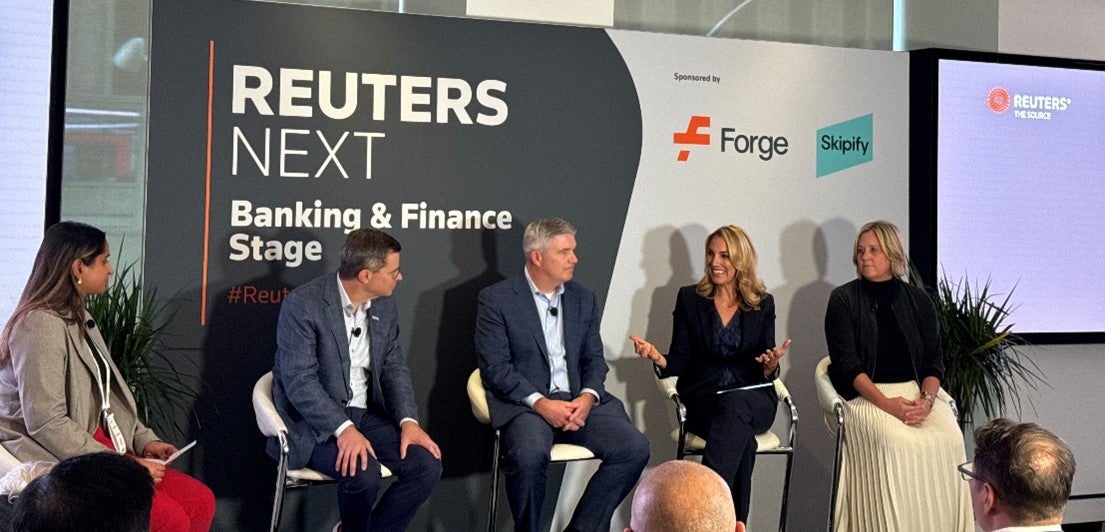press release
CBA’s Johnson at Reuters NEXT: “It’s the Cumulative Impact of Regulations”
Weston Loyd

NEW YORK, N.Y. – Consumer Bankers Association (CBA) President and CEO Lindsey Johnson this week participated in a panel discussion at the Reuters NEXT Conference on the health of the consumer, what’s next for the economy, and how the cumulative effect of current and expected regulatory proposals may impede banks’ ability to continue to deliver on their mission.
The panel was moderated by Reuters’ Anita Ramaswamy and other panelists included Bank of America’s President of Retail Banking Holly O’Neill, U.S. Bank’s Vice Chair of Consumer and Business Banking Tim Welsh, and Barclays’ U.S. Consumer Bank CEO Denny Nealon.
Below are excerpts from Johnson as delivered on the panel:
On the heightened regulatory environment:
“It’s the cumulative impact of regulations. Nobody is taking a look at how much this is going to cost the industry and individual families – from Basel III, from the additional requirements under CRA, from the additional requirements under Regulation II, which is debit interchange, and the credit card late fee proposal. I mean, it may sound good on its surface, but I can promise you that if you scratch that just a tiny bit under the surface, you can immediately see that [these regulations are] going to reduce access to credit. And that really worries me because nobody, including the regulators, has looked at it across the board to try to understand what is the cumulative impact of all of this.”On proposed capital requirements:
“Just the top four banks alone hold more than $900 billion in Common Equity Tier 1 capital, which is the most loss absorbing capital that they can hold. These [banks] are incredibly highly capitalized institutions. And if you look at the different risk weights in this [Basel III] proposal, when you think about those individual types of consumer needs – mortgage lending, auto loans, open credit lines – this will have a direct impact on the consumer and on their credit access. It makes it more costly. We know it will have a direct impact…and it sometimes get lost in the narrative. But that's the ultimate thing that [consumers] should care about the most.”On generative artificial intelligence (AI) in banking:
“As an industry, there's a huge recognition that there is so much promise for generative AI…I was talking to a [bank] CEO a few weeks ago and they said they have identified 135 use cases for generative AI, which is incredible. It's everything from financial inclusion, where you can identify borrowers who may have otherwise been on the cusp and be able to underwrite them better. This technology can help consumers – from moving upwards in their financial journey, to security, from fraud management to risk management. This is a topic the industry is really excited about.”CBA bank executives also led in this discussion, talking about some of the latest technological advances and how their banks are considering the next frontier of Generative AI to meet their banks’ and clients’ needs. Holly O’Neill spoke about how Bank of America continues to lead in the area of artificial intelligence – even after the launch of their AI Chat Bot, “Erica” in 2018 – which has since seen more than 1.5 billion interactions with over 35 million Bank of America clients. The functionality of Erica continues to evolve and improve, even as Bank of America develops even more technology to improve customer experience and simplify meeting their clients’ financial goals. Tim Welsh discussed the ways that U.S. Bank continues to evolve to meet consumers’ needs whether they are banking from the “palm of their hand” to their bank branching centers – and how their people and purpose are being further met by new technology and innovation. Denny Nealon spoke about the partnership Barclays and many other banks have with fintechs, as they enable banks to provide consumers with more products, services, and tools that make the digital banking experience more seamless.


